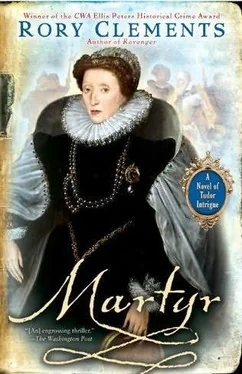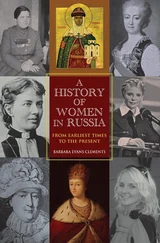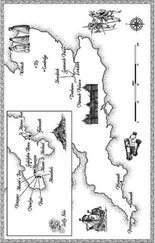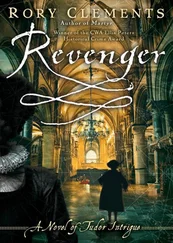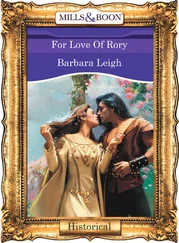Rory Clements - Martyr
Здесь есть возможность читать онлайн «Rory Clements - Martyr» весь текст электронной книги совершенно бесплатно (целиком полную версию без сокращений). В некоторых случаях можно слушать аудио, скачать через торрент в формате fb2 и присутствует краткое содержание. Жанр: Исторический детектив, на английском языке. Описание произведения, (предисловие) а так же отзывы посетителей доступны на портале библиотеки ЛибКат.
- Название:Martyr
- Автор:
- Жанр:
- Год:неизвестен
- ISBN:нет данных
- Рейтинг книги:3 / 5. Голосов: 1
-
Избранное:Добавить в избранное
- Отзывы:
-
Ваша оценка:
- 60
- 1
- 2
- 3
- 4
- 5
Martyr: краткое содержание, описание и аннотация
Предлагаем к чтению аннотацию, описание, краткое содержание или предисловие (зависит от того, что написал сам автор книги «Martyr»). Если вы не нашли необходимую информацию о книге — напишите в комментариях, мы постараемся отыскать её.
Martyr — читать онлайн бесплатно полную книгу (весь текст) целиком
Ниже представлен текст книги, разбитый по страницам. Система сохранения места последней прочитанной страницы, позволяет с удобством читать онлайн бесплатно книгу «Martyr», без необходимости каждый раз заново искать на чём Вы остановились. Поставьте закладку, и сможете в любой момент перейти на страницу, на которой закончили чтение.
Интервал:
Закладка:
Walsingham cleared his throat. “So there we have it. Drake has been saved. For the moment. But keep vigilant and work hard to discover conspiracies in the dunghills of London. This will not be the last of Mendoza’s plots on behalf of his prince. Say your prayers, gentlemen, every morning and every evening and ofttimes in between, for truly it is in God’s hands now whether England lives or dies.” As the assembled rose to leave, Walsingham raised his index finger to Shakespeare. “You stay, Mr. Shakespeare.”
When they were alone, Walsingham offered Shakespeare refreshment then began pacing the room, his hands clasped behind his back. Shakespeare watched him in silence. At last Mr. Secretary spoke.
“There is one final matter, John, of which I thought it best to speak with you alone. The matter of Robert Southwell, the Jesuit priest. You haven’t found him yet… have you?”
“No, Sir Francis,” Shakespeare said instantly. He had rehearsed this moment in his mind. Perhaps he had met Southwell, but if so he could never be sure, for the priest had never admitted his name.
“Topcliffe believes you did meet him. He believes he was harbored by Thomas Woode and his governess, Catherine Marvell, and that you somehow colluded with them.”
“That is not true. I have colluded with no one.”
“Yet if you did find this Jesuit, you would tell me, would you not?”
“Indeed I would, Mr. Secretary.”
“And if you thought that Woode and Mistress Marvell were harboring Jesuit priests, you would tell me that, too?”
“I am sure they are not harboring Jesuit priests, Mr. Secretary.”
Walsingham raised a dark eyebrow. “Interesting phrasing, John. The present tense. Surely you are not learning the Romish art of equivocation?”
“Mr. Secretary?”
Walsingham picked up a paper from the table. “I will let it pass. This time. But you must not deal lightly with these Jesuits, John. This Southwell is our bitter enemy.” He showed the paper to Shakespeare. “You see there is a verse here. It is by Southwell. Read it, John, though it turn your stomach. You see he calls Mary of Scots a saint and a rose and a martyr. This is the woman who worked for the death of our beloved sovereign, and he calls her saint.”
Shakespeare read the verse. Was this the man he’d met in the knot garden? How had he written such a thing? Surely even Roman Catholics must know Mary Stuart for a scheming murderess?
Walsingham took the paper back from him. “Enough. I will just tell you that this Thomas Woode is known to my intelligencers in Rome, where he has been a generous benefactor of the English college. Let us now speak of other things. Tell me, John, I believe there is a fondness between you and Mistress Marvell? Is that correct?”
Shakespeare breathed deeply. “There was a fondness, sir.”
“It is finished?”
Shakespeare nodded again; he could not speak.
Walsingham’s voice softened. “I am sorry. But it is for the best, John. I understand your sorrow, but it is for the best. Trust me on this; such attachments cannot survive in the present climate, not while you do the vital work you do, not while suspicion and sedition lurk in the shadows…”
Shakespeare wanted to shout that it was not for the best, that his heart was broken. He wanted to shout that he would rather be a schoolteacher and married to Catherine than do this job and be without her. But no words would form in his throat.
Walsingham saw his distress and poured wine. “We will talk no more about it. You must have a few days away from your toiling, John. I believe your brother has arrived; spend some time with him if you wish. You have suffered injuries; make yourself whole. But before you take your well-earned rest-and your ride to Plymouth and all that ensued was, indeed, magnificent and much admired by Her Majesty-I have one more task for you. I want you to go to Lord Howard of Effingham and tell him you have solved the murder of his daughter. You are to tell him that the killer was a man called Herrick, who is now executed for that murder and for the attempted murder of Sir Francis Drake.”
At last, Shakespeare found his voice. “You are asking me to say something that we both know to be a lie, Mr. Secretary. We both know who killed Lady Blanche Howard.”
Walsingham’s face tightened. “Do this for me, John. I have had to make excuses for you; I have gone up against a man beloved of our Queen to save you from the weight of the law. We must do unpleasant things sometimes to protect ourselves from an infinitely greater evil. Which of us would be spared by the Inquisition should the Spanish prevail? The answer is none. We seek only those who sow discord. So you will do this thing for me and I promise you that Mr. Thomas Woode and Mistress Catherine Marvell will never be threatened or molested by Richard Topcliffe again. Do you understand?”
Shakespeare nodded.
“Then do it today, John. And God go with you.”
Chapter 48
Boltfoot Cooper looked uncommonly awkward. He held his cap between his gnarled hands and twisted it as if he were wringing the neck of a fowl.
Shakespeare studied him quizzically. “Tell me, Boltfoot, what happened with your inquiries into the whereabouts of the four vagabonds from Hog Lane?”
“I have discovered them and set them free.”
“Really, Boltfoot? That is wonderful news. Pray, where were they?”
“Still in Bridewell, master.”
“In Bridewell!”
“They were in none of the other prisons, so I went back there. As I questioned the turnkey he looked increasingly uncomfortable, guilty even. In the end I threatened him with the might of Mr. Secretary-and yourself, of course-and he broke down all afraid and confessed they were still there. Newall had ordered him to say they had gone. I think it probable there was some garnish involved in the transaction, though the turnkey denies it.”
“What! I shall have that cheating, dissembling gaoler up before the aldermen for this. He insisted to me that they had been taken away to another prison. But what of the four men; what is their condition?”
“Poor, master. They had been flogged, set to work stripping oakum, and were half-starved. But all are alive and will recover from their tribulations. I have returned them, well fed and watered, to their company.”
“And did you question them about what they witnessed on the night of the fire?”
“I did, and they swear they saw nothing except the fire itself. The chiefest among the four told me that when they saw the fire they rushed to help. They carried pails for two hours until it was doused, then, exhausted, they went to sleep in the stable block. They said it was warmer there than at the Theatre.”
“So they did not see a body taken to the house in Hog Lane?”
“No, master.”
“And they knew nothing of Lady Blanche?”
Boltfoot shook his head. “Nor did they see anything at all suspicious.”
Shakespeare mulled this information. Of course, Topcliffe could not have been sure whether the four men had seen anything or not, but when he discovered they had slept close by, he thought it safest to keep them where Shakespeare could not question them. Where better than right under his nose? “Well done, Boltfoot. You have been a diligent servant.”
“Thank you, master,” Boltfoot said, pleased, yet making no effort to leave. He began twisting his cap even harder. Any rooster or capon locked by the neck between his powerful hands would be long dead by now. “Master Shakespeare,” he said, averting his gaze, “I would ask you a favor, sir, a boon if you will.”
Shakespeare sighed. “Do get to the point. I know very well that you want my permission to court and woo Jane, yes?”
Читать дальшеИнтервал:
Закладка:
Похожие книги на «Martyr»
Представляем Вашему вниманию похожие книги на «Martyr» списком для выбора. Мы отобрали схожую по названию и смыслу литературу в надежде предоставить читателям больше вариантов отыскать новые, интересные, ещё непрочитанные произведения.
Обсуждение, отзывы о книге «Martyr» и просто собственные мнения читателей. Оставьте ваши комментарии, напишите, что Вы думаете о произведении, его смысле или главных героях. Укажите что конкретно понравилось, а что нет, и почему Вы так считаете.
